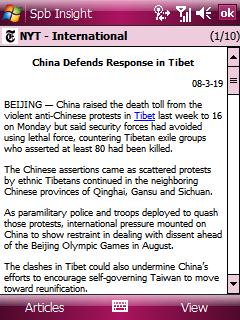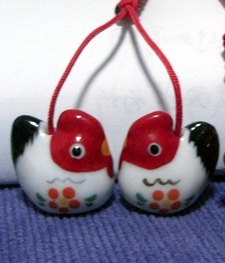其实一直都是这么乱,新疆也差不多,国内的新闻不能相信,国外的中文新闻也是不能相信的,现在网上大多数流转的照片,发生地并不是在拉萨,虽然如此,我还是很想去新疆。
 China Defends Response in Tibet
China Defends Response in Tibet
08-3-19
BEIJING — China raised the death toll from the violent anti-Chinese protests in Tibet last week to 16 on Monday but said security forces had avoided using lethal force, countering Tibetan exile groups who asserted at least 80 had been killed.
The Chinese assertions came as scattered protests by ethnic Tibetans continued in the neighboring Chinese provinces of Qinghai, Gansu and Sichuan.
As paramilitary police and troops deployed to quash those protests, international pressure mounted on China to show restraint in dealing with dissent ahead of the Beijing Olympic Games in August.
The clashes in Tibet could also undermine China’s efforts to encourage self-governing Taiwan to move toward reunification.
In the final days of campaigning ahead of the island’s presidential election Saturday, both major political parties condemned Beijing’s suppression of protests in Tibet.
Chinese officials said the Tibetan regional capital, Lhasa, was quiet Monday after the biggest anti-government protests in almost two decades turned violent Friday.
Earlier, state media reported that 10 people had been killed when Tibetans went on a rampage attacking ethnic Chinese and destroying their shops and property.
The senior Chinese political leader in Tibet, Qiangba Puncog, said at a news conference in Beijing on Monday that security forces had used only water cannon and tear gas to disperse protesters in Lhasa.
He said 13 of those killed in the protests were “innocent civilians” attacked by the mob.
Another three Tibetans had died when they jumped from the roof of a building after refusing to surrender to police, he said.
Mr. Puncog, an ethnic Tibetan, said supporters of Tibet’s exiled spiritual leader, the Dalai Lama, had organized the unrest in an effort to generate publicity during the Olympics.
“Calm has returned to Lhasa, and society has returned to a state of normality,” The Associated Press quoted him as saying.
“This was organized, premeditated, masterminded and incited by the Dalai clique, and it was created under the collusion of Tibet independence separatist forces both inside and outside of China,” he was reported by the news agency to have said. “Those activities were aimed at splitting the country, were aimed at undermining ethnic community and undermining social harmony and stability in Tibet.”
The Dalai Lama on Sunday accused China of waging “cultural genocide” in Tibet and called for an international inquiry into the suppression of the protests.
From the headquarters of the Tibetan government in exile in Dharamsala, India, he said Tibetans had the right to peaceful protest.
There has been no independent corroboration of either the Chinese or Tibetan exile version of the casualties and damge from the protests in Tibet.
The Chinese authorities have barred foreign journalists from Tibet and access for other foreigners including tourists has been “temporarily” suspended, according to government officials.
Footage of Lhasa streets shown by Hong Kong television over the weekend showed a heavy Chinese military and police presence on streets still covered with debris. The Chinese authorities have set a deadline of midnight Monday for those who took part in the demonstrations to give themselves up or face harsh penalties.
Journalists and photographers attempting to cover the outlying protests said they had been taken into “protective detention” and prevented from approaching sensitive areas.
For China, the timing of the unrest in Tibet has drawn unwelcome attention to some of the longstanding tensions in the country at a time when the ruling Communist Party is planning a show of unity and harmony during the Olympics.
China says Tibet has been part of its territory for hundreds of years but Beijing has exerted full control only since 1950, when Communist troops invaded the region.
The catalyst for last week’s violence was a series of pro-independence protests led by Buddhist monks to mark the 49th anniversary of a failed uprising that forced the Dalai Lama into exile.
Now China is under international pressure to avoid further bloodshed or a heavy-handed crackdown in Tibet.
The president of the International Olympic Committee, Jacques Rogge, said on Sunday the Olympic body was very concerned about the situation in Tibet.
“The IOC hopes that there can be an appeasement as soon as possible to this situation, and I also want to offer our condolences to the relatives of those people who lost their lives,” The Associated Press reported Rogge saying. Earlier, Rogge had ruled out a boycott of the games because it would only penalize the competitors.
Australia, the United States, Japan and Europe have also called on Beijing to exercise restraint.
“With the approach of the Olympic Games, which ought to be a great show of fraternity, France would like to draw the attention of the Chinese authorities to the importance of respecting human rights,” the French Foreign Ministry said in a statement.
In Taiwan, the pro-independence ruling party of outgoing President Chen Shui-bian seized on the violence in Tibet and China’s threat of harsh measures against protesters as a warning of what could lie in store for the island if it was reunited with the mainland.
The front-runner in the presidential race, the Nationalist Party candidate Ma Ying-jeou, has campaigned strongly for improved ties with China, but he also called for an end to the “violence used by Beijing authorities.”
Curbs on Protest in Tibet Lashed by Dalai Lama
08-3-18
DHARAMSALA, India — The Dalai Lama accused China on Sunday of waging “cultural genocide” against his followers in Tibet and called for an international inquiry into the suppression of protests there, his strongest defense to date of Tibetan Buddhists who have staged an uprising against Chinese rule.
Speaking at the headquarters of the Tibetan government in exile, the Dalai Lama endorsed the right of his people to press grievances peacefully against the Chinese authorities, and said he would not ask Tibetans to surrender to Chinese military police by midnight on Monday, as Beijing has demanded. He said that he had no moral authority to do so and that Tibetans had beseeched him not to capitulate to that demand.
“Whether the Chinese government admits it or not, a nation with an ancient cultural heritage is actually facing serious dangers,” the Dalai Lama told reporters during an emotionally charged news conference here. “Whether intentionally or unintentionally, some kind of cultural genocide is taking place.”
His comments reflected the inflamed passions among Tibetans abroad, who view the revolts, the largest since the late 1980s, as a watershed moment.
Some Tibetans hope to press for outright independence from China. They argue that they have an unprecedented political opportunity to push for change as China prepares to be the host country for the Olympic Games in August and faces intense scrutiny of its human rights record.
The Dalai Lama, 72, who heads the Tibetan government in exile and serves as the spiritual leader of Tibetan Buddhism, does not call for Tibetan independence and has remained far more cautious, fearing that the reprisals could worsen in Tibet. But his tone on Sunday and the words he chose to describe the Chinese crackdown are the strongest he has used since his representatives began negotiations with the Chinese in 2002.
Though the impact of the Dalai Lama’s words was difficult to gauge, they were almost certain to further enrage Beijing. Even as he spoke, there were unconfirmed reports that demonstrations by ethnic Tibetans had spread to the nearby Chinese provinces of Sichuan, Gansu and Qinghai.
The developments also appeared to diminish the Dalai Lama’s hopes of persuading Chinese leaders to allow him to return to Tibet, his goal in talks between his representatives and Communist Party leaders.
“They have no experience how to deal with problems through talk, only suppress,” he said.
Aides to the Dalai Lama said they had confirmed 80 killings on March 13 and 14 in Lhasa, Tibet’s capital, including 26 victims killed just outside Drapchi prison. Tibetan exiles in Dharamsala said they had also received news that at least two Buddhist monks had set themselves afire in protest. The claims could not be independently confirmed. China says the death toll in the recent unrest is much lower.
China says Tibet has been part of its territory for hundreds of years. It has exercised full control only since 1951.
Several times during the news conference, the Dalai Lama reminded reporters that he was not calling for secession. “As far as material development concerned, we get much benefit” from being part of China, he said. He also said he remained supportive of the Olympics’ being held in China but called on the international community to exercise its “moral responsibility” to remind Beijing about human rights.
Asked whether he endorsed the protests in Tibet, during which, the Chinese authorities say, ethnic Tibetans assaulted Han Chinese, the Dalai Lama said Tibetans were entitled to air grievances peacefully. “Protest — peaceful way express their deep resentment — is a right,” he said.
The unrest comes during the twilight of the Dalai Lama’s life, during which he has achieved awards and acclaim but little progress to resolve the fate of Tibet, which he fled for India after a failed uprising in 1959.
China has consolidated its hold on the frontier region, most recently extending a rail line that many Tibetans believe will spread Han Chinese domination.
Some Tibetans say they fear that Beijing is simply waiting for the Dalai Lama to die in hopes that his influence will be difficult to replicate.
The latest clashes in Lhasa are by far the largest since the late 1980s, when China declared martial law and violently suppressed demonstrations there, leaving scores, perhaps hundreds, of ethnic Tibetans dead. The Dalai Lama said Sunday that he feared such a crackdown again.
“I do feel helpless,” he said. “I feel very sad, very serious, very anxious. Cannot do anything.”
The Dalai Lama said the Chinese ultimatum to Tibetan protesters to surrender reminded him of 1959. Asked if he could stop the protesters from defying the deadline, he replied, “I have no such power.”
He went on to say that he had spoken with a caller in Tibet on Saturday who said, “Please don’t ask us to stop.” The Dalai Lama promised he would not, even though he expected the Chinese authorities to suppress the protests with force.
“Now we really need miracle power,” he said, before laughing starkly. “But miracle seems unrealistic.”
He took questions for more than an hour inside a temple in the lap of snow-capped Himalayas. The limits of his influence, and even his “middle path” message of freedom for Tibetans, rather than total independence for Tibet, came into sharp relief as thousands of mostly young Tibetan exiles raised a chorus of stridently anti-Chinese slogans and called for outright secession.
“We, the young people, feel independence is our birthright,” said Dolma Choephel, 34, a social worker active with the Tibetan Youth Congress, who went to a demonstration on Sunday morning outside the gates of the main town temple. “We understand the limitations of the Dalai Lama’s approach. What we got after six rounds of talks — this violence?”
She was referring to the six negotiating sessions between the Dalai Lama’s representatives and Chinese authorities over the past six years.
Just behind where Ms. Choephel stood, Buddhist monks began a hunger strike. Protesters laid Chinese flags on the road, inviting cars and pedestrians to trample them. Later, thousands streamed down the hill, to Dharamsala town, the largest Tibetan settlement in India. Many had painted their faces with the colors of the Tibetan flag.
“Long live the Dalai Lama,” they chanted, making it plain that, despite their more radical calls, they remained loyal to him.
For the second consecutive day, protests appeared to have spread into Tibetan-populated regions beyond Tibet. Buddhist monks and the police reportedly clashed in Aba County in Sichuan Province. A crowd of about 200 Tibetan protesters burned a local police station, according to news agency reports. One witness said a police officer was killed in the confrontation.
The India-based Tibet Center for Human Rights and Democracy reported that the police had killed at least eight Tibetan protesters. Meanwhile, monks at a monastery in Qinghai Province defied an order to remain inside the Rongwo Monastery, according to The Associated Press.
A day after Buddhist monks and other Tibetans demonstrated in Xiahe in Gansu Province, residents said the military police had secured the city. Witnesses said numerous people were injured in Xiahe after the Tibetans hurled rocks and the police responded with tear gas.
Meanwhile, Chinese military police continued to canvass the streets of Lhasa on Sunday in what has become a virtual lockdown of the city. More than 200 transport vehicles, each carrying as many as 60 military policemen, had moved into the central part of Lhasa, according to a Hong Kong television crew there.
Foreigners were blocked from traveling to Lhasa, while some tourists trapped there during the riots said the authorities were arranging for them to leave. Some witnesses reported continued unrest in small pockets of the city and described hearing the sound of gunshots.
India has been the host country for Tibetan refugees since the Dalai Lama’s exodus, but on condition that they not protest against the Chinese government on Indian soil. India’s efforts to improve ties with China in recent years have made the Tibet issue exceptionally tricky. The Dalai Lama, while acknowledging India’s hospitality, described the government’s official position as “overcautious.”
Hari Kumar contributed reporting from Dharamsala, and Jim Yardley from Beijing.








